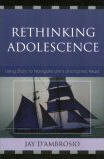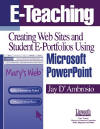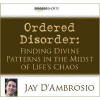Rethinking Manuel
The Story of Manuel
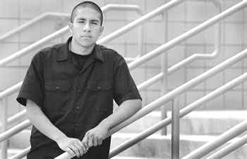 Manuel, a thirteen-year-old student, moved into the school district from Los Angeles halfway through the year. He was somewhat flippant about school rules, and as the year progressed, he found himself in trouble more often than not. Manuel was in and out of detention and eventually was suspended from school for a period of time. His home life was chaotic. His father had walked out on the family when he was very young, and he and his mother had lived with one relative after another over a period of several years. Furthermore, being Latino in a predominately white, suburban school wasn’t easy.
Manuel, a thirteen-year-old student, moved into the school district from Los Angeles halfway through the year. He was somewhat flippant about school rules, and as the year progressed, he found himself in trouble more often than not. Manuel was in and out of detention and eventually was suspended from school for a period of time. His home life was chaotic. His father had walked out on the family when he was very young, and he and his mother had lived with one relative after another over a period of several years. Furthermore, being Latino in a predominately white, suburban school wasn’t easy.His math teacher, Mr. Alfhild, noticed that Manuel was really struggling in this new environment. As a teacher, what could he do? How could he intervene in a situation that didn’t develop overnight any more than it could be “solved” overnight? It had to start with Manuel. The boy had no idea of his place in the world. Who was he? He was well acquainted with what the disparaging voices of the enemy had been shouting at him most of his life: “You are a troublemaker! You have no home. You can’t be trusted!” But who was he really? Helping Manuel build a positive sense of identity was the key. Mr. Alfhild had to follow the archetype that the great storytellers had been whispering throughout the millennia.
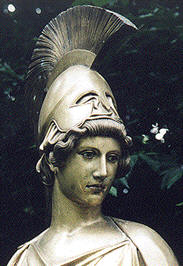 One day they happened to have a few moments to chat—more accurately, Mr. Alfhild, like Athena, arranged for the encounter. When Manuel walked into the math classroom, Mr. Alfhild knew by the look on his face that Manuel thought he had done something wrong. He asked him to sit down. Manuel looked nervous. What happened next was a complete surprise. Mr. Alfhild told Manuel that he had been observing him for quite a while now and had noticed that he possessed many good qualities. Manuel appeared somewhat shocked that Mr. Alfhild had not brought him in to yell at him or confront him about this problem or that. Instead, Mr. Alfhild had asked Manuel to meet so that he could pay him a compliment!
One day they happened to have a few moments to chat—more accurately, Mr. Alfhild, like Athena, arranged for the encounter. When Manuel walked into the math classroom, Mr. Alfhild knew by the look on his face that Manuel thought he had done something wrong. He asked him to sit down. Manuel looked nervous. What happened next was a complete surprise. Mr. Alfhild told Manuel that he had been observing him for quite a while now and had noticed that he possessed many good qualities. Manuel appeared somewhat shocked that Mr. Alfhild had not brought him in to yell at him or confront him about this problem or that. Instead, Mr. Alfhild had asked Manuel to meet so that he could pay him a compliment!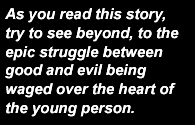 It is so important that we look for the positive things in a young person’s life. If we search for the negative, we are sure to find it. Isn’t that true about your own life as well? This can really be a challenge! We are so conditioned to seek the negative that we can completely overlook the positive in other people. Students especially need to hear us affirm the good in their lives. It is important to look beyond what a young person is right now, at this present moment, and instead see what they could become. The children look up to us and respect what we as adult leaders have to say (despite messages they may convey to the contrary). We carry an authority that comes with our position. Use it wisely!
It is so important that we look for the positive things in a young person’s life. If we search for the negative, we are sure to find it. Isn’t that true about your own life as well? This can really be a challenge! We are so conditioned to seek the negative that we can completely overlook the positive in other people. Students especially need to hear us affirm the good in their lives. It is important to look beyond what a young person is right now, at this present moment, and instead see what they could become. The children look up to us and respect what we as adult leaders have to say (despite messages they may convey to the contrary). We carry an authority that comes with our position. Use it wisely!After reinforcing Manuel’s good qualities and the potential Mr. Alfhild saw in him, he thought about the second piece to the mythical model, bequeathing a gift. What could a teacher give to him? Well, let’s see. Menelaus gave Telemachus a silver bowl, crafted by the gods themselves. No . . . what would Manuel do with a silver bowl? Obi-Wan entrusted Luke with his father’s light saber. Seriously, what would a thirteen-year-old boy do with a Jedi’s weapon? Probably have the time of his life! Mr. Miyagi bequeathed his classic yellow car to Daniel LaRusso. But Manuel was thirteen, not sixteen, and what teacher can just go around giving away cars? No, this had to be something different. What Mr. Alfhild ended up giving Manuel was a job. Manuel would now be Mr. Alfhild’s official office runner. If he had some important memo to send to the office, he would carefully seal it in an envelope and hand it over to Manuel for safe delivery.
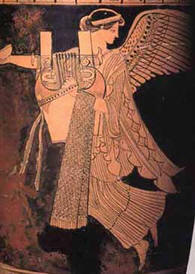 To an adult, this duty might have seemed like a chore. However, looking at this new role through the eyes of a middle school student is a completely different experience. What had Mr. Alfhild really given to Manuel? On the surface, a job, but remember that the gift is always a concrete demonstration of something deeper. He was giving him his trust, something no one had offered him before. Mr. Alfhild was expressing with that gift the idea that Manuel was trustworthy. He was good. He was now an “office runner,” someone to be trusted, not just a troublemaker. He had a position and a title. As Manuel began to live up to the gift that was given to him, Mr. Alfhild could tell that there were subtle changes in his demeanor. He became friendlier with other teachers in the building, and because of that, other teachers began treating him in the same manner. We teach people how to treat us, and that’s just what Manuel began to learn. At the end of the year, Mr. Alfhild gave him a certificate as an award for being an excellent office runner. It was well deserved!
To an adult, this duty might have seemed like a chore. However, looking at this new role through the eyes of a middle school student is a completely different experience. What had Mr. Alfhild really given to Manuel? On the surface, a job, but remember that the gift is always a concrete demonstration of something deeper. He was giving him his trust, something no one had offered him before. Mr. Alfhild was expressing with that gift the idea that Manuel was trustworthy. He was good. He was now an “office runner,” someone to be trusted, not just a troublemaker. He had a position and a title. As Manuel began to live up to the gift that was given to him, Mr. Alfhild could tell that there were subtle changes in his demeanor. He became friendlier with other teachers in the building, and because of that, other teachers began treating him in the same manner. We teach people how to treat us, and that’s just what Manuel began to learn. At the end of the year, Mr. Alfhild gave him a certificate as an award for being an excellent office runner. It was well deserved!Labels: affirmation, Alfhild, archetype, Athena, authority, challenge, enemy, Jedi, Latino, Los Angeles, Luke, Manuel, Menelaus, Miyagi, positive, school, storyteller, teacher, trust
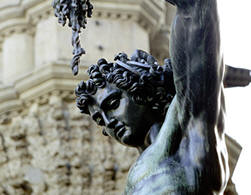 The Greek hero Perseus was sent into exile as a child by his fearful grandfather who was told by an oracle that his grandson would one day bring an end to his rule. He and his mother Danae were locked in a wooden chest and set adrift on the sea until one day they landed on the shores of the island of Seriphos. The young hero grew up on this island with no real idea of his place in the world. He was lost. He doubted himself and his ability to face the serious challenges of life.
The Greek hero Perseus was sent into exile as a child by his fearful grandfather who was told by an oracle that his grandson would one day bring an end to his rule. He and his mother Danae were locked in a wooden chest and set adrift on the sea until one day they landed on the shores of the island of Seriphos. The young hero grew up on this island with no real idea of his place in the world. He was lost. He doubted himself and his ability to face the serious challenges of life. One day, the king of the island, Polydectes, demanded tribute from Perseus and his mother, a tribute that neither could afford to pay. Perseus pleaded with the king, saying that he had nothing to offer but his service. The king, seizing the opportunity, assigned to Perseus what seemed to be an impossible task: he wanted the head of the fearsome Gorgon Medusa. The Gorgons were creatures, loathed by gods and men, whose hair was comprised of venomous snakes. They possessed the chilling ability to turn those that gazed upon her hideous faces into stone.
One day, the king of the island, Polydectes, demanded tribute from Perseus and his mother, a tribute that neither could afford to pay. Perseus pleaded with the king, saying that he had nothing to offer but his service. The king, seizing the opportunity, assigned to Perseus what seemed to be an impossible task: he wanted the head of the fearsome Gorgon Medusa. The Gorgons were creatures, loathed by gods and men, whose hair was comprised of venomous snakes. They possessed the chilling ability to turn those that gazed upon her hideous faces into stone. Demonstrating her faith in the young hero in a way that was very concrete, Athena gave him her very own shield, a reflective shield that would allow him to see Medusa without gazing directly at her. She further directed him where to acquire the other tools he would need to complete his quest, including a sword, a helmet of invisibility, winged sandals, and a magical bag. The young hero went forth, knowing that a goddess believed that there was something in him that was capable of accomplishing great deeds. He also carried with him the physical representation of Athena’s belief in him, the shield, sword, and other implements necessary to achieve his goal.
Demonstrating her faith in the young hero in a way that was very concrete, Athena gave him her very own shield, a reflective shield that would allow him to see Medusa without gazing directly at her. She further directed him where to acquire the other tools he would need to complete his quest, including a sword, a helmet of invisibility, winged sandals, and a magical bag. The young hero went forth, knowing that a goddess believed that there was something in him that was capable of accomplishing great deeds. He also carried with him the physical representation of Athena’s belief in him, the shield, sword, and other implements necessary to achieve his goal.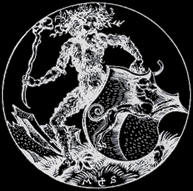 An old German folktale, “Iron Hans,” tells of a wild man who spirits a young prince away from his palace to the wilderness. There he affirms the young man’s innate strength and courage. Demonstrating his confidence in the youth, the wild man eventually gives him command of a mighty army with which he is able to defend a kingdom from invasion!
An old German folktale, “Iron Hans,” tells of a wild man who spirits a young prince away from his palace to the wilderness. There he affirms the young man’s innate strength and courage. Demonstrating his confidence in the youth, the wild man eventually gives him command of a mighty army with which he is able to defend a kingdom from invasion!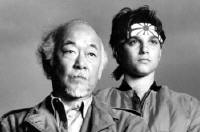 In the 1984 movie The Karate Kid, Mr. Miyagi repairs Daniel LaRusso’s bicycle after a brutal assault on Daniel by a gang of bullies, letting him know that he matters. He then goes on to teach him the dangerous art of karate, letting him know that he trusts him to use it in a way that will not seek to harm others. The final gift he then presents Daniel blows him away! Mr. Miyagi handed him the keys to a beautiful yellow, classic car on his sixteenth birthday. This demonstrates that the older Miyagi has respect for and trusts the younger LaRusso to handle the responsibility wisely. Miyagi quietly but firmly delivers blows to the enemy who would crush his young pupil's heart.
In the 1984 movie The Karate Kid, Mr. Miyagi repairs Daniel LaRusso’s bicycle after a brutal assault on Daniel by a gang of bullies, letting him know that he matters. He then goes on to teach him the dangerous art of karate, letting him know that he trusts him to use it in a way that will not seek to harm others. The final gift he then presents Daniel blows him away! Mr. Miyagi handed him the keys to a beautiful yellow, classic car on his sixteenth birthday. This demonstrates that the older Miyagi has respect for and trusts the younger LaRusso to handle the responsibility wisely. Miyagi quietly but firmly delivers blows to the enemy who would crush his young pupil's heart.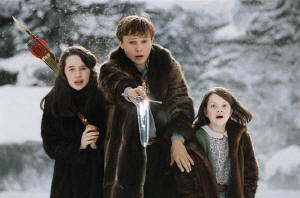 Do we see this pattern in other stories—a mentor or authority figure callings out the good, strong, and virtuous qualities of a younger individual, then reinforcing this new identity through a meaningful gift? Absolutely! C. S. Lewis’s beloved book The Lion, the Witch, and the Wardrobe (1950) portrays this pattern beautifully. When the four Pevensie children find themselves in the magical realm of Narnia, they are confronted with the deadly reality that this amazing land is suffering under the wintry spell of the White Witch. There is a war brewing between the forces of light and darkness, good and evil.
Do we see this pattern in other stories—a mentor or authority figure callings out the good, strong, and virtuous qualities of a younger individual, then reinforcing this new identity through a meaningful gift? Absolutely! C. S. Lewis’s beloved book The Lion, the Witch, and the Wardrobe (1950) portrays this pattern beautifully. When the four Pevensie children find themselves in the magical realm of Narnia, they are confronted with the deadly reality that this amazing land is suffering under the wintry spell of the White Witch. There is a war brewing between the forces of light and darkness, good and evil. Further following the pattern we’ve observed in other stories, the great Lion goes on to bestow unique gifts upon each of the children. To Lucy, the younger girl, he gives a magical, healing cordial. This gift affirms a wonderful quality in this young girl, that she is a healer at heart; she has a deep desire to help others in need. Aslan then gifts Susan, the older girl, with a powerful horn that will summon help whenever help is most needed. You see, Susan often struggled with self-image and longed to know that she was worth rescuing, worth fighting for. Finally, to the boys, Peter and Edmund, Aslan gives swords and shields. These are dangerous weapons in the hands of children, and weapons can be used for either great good or great evil. In human history, with weapons the Afghans were liberated from the tyranny of the Taliban, and with weapons the Mongols exacted their terrible toll upon the continent of Asia. The outcome depends upon who wields the weapons. Even though Peter and Edmund felt frightened by the war that was threatening to engulf them, Aslan saw what the boys were on the inside: fierce warriors who would defend the side of good with passion and heart. Knowing that someone who was wise, good, and powerful believed in them made all the difference in the world!
Further following the pattern we’ve observed in other stories, the great Lion goes on to bestow unique gifts upon each of the children. To Lucy, the younger girl, he gives a magical, healing cordial. This gift affirms a wonderful quality in this young girl, that she is a healer at heart; she has a deep desire to help others in need. Aslan then gifts Susan, the older girl, with a powerful horn that will summon help whenever help is most needed. You see, Susan often struggled with self-image and longed to know that she was worth rescuing, worth fighting for. Finally, to the boys, Peter and Edmund, Aslan gives swords and shields. These are dangerous weapons in the hands of children, and weapons can be used for either great good or great evil. In human history, with weapons the Afghans were liberated from the tyranny of the Taliban, and with weapons the Mongols exacted their terrible toll upon the continent of Asia. The outcome depends upon who wields the weapons. Even though Peter and Edmund felt frightened by the war that was threatening to engulf them, Aslan saw what the boys were on the inside: fierce warriors who would defend the side of good with passion and heart. Knowing that someone who was wise, good, and powerful believed in them made all the difference in the world!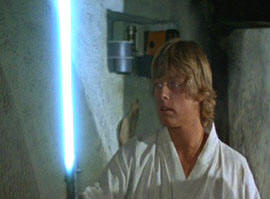 Menelaus bequeathed a royal silver bowl to Telemachus, endorsing the young prince as the rightful heir of Odysseus; likewise, Obi-Wan gave Luke his father’s light saber, the weapon of the Jedi. What else was he giving Luke through the gift of a powerful weapon? What was the unspoken message? Obi-Wan was letting him know that, as the son of a Jedi, Luke had what it takes to wield such an implement. He was also extending his trust. He trusted that Luke would use the weapon for good and not evil. What did Menelaus really give Telemachus? It was nothing less than a potent symbolic declaration that young man was worthy of royal authority. What powerful statements—and this time without words!
Menelaus bequeathed a royal silver bowl to Telemachus, endorsing the young prince as the rightful heir of Odysseus; likewise, Obi-Wan gave Luke his father’s light saber, the weapon of the Jedi. What else was he giving Luke through the gift of a powerful weapon? What was the unspoken message? Obi-Wan was letting him know that, as the son of a Jedi, Luke had what it takes to wield such an implement. He was also extending his trust. He trusted that Luke would use the weapon for good and not evil. What did Menelaus really give Telemachus? It was nothing less than a potent symbolic declaration that young man was worthy of royal authority. What powerful statements—and this time without words!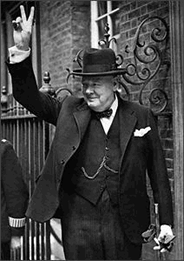 As adult leaders, we sometimes forget the influence we have over the young lives we encounter. Despite outward appearances and words to the contrary, they look to us for answers. A great deal of the angst we see in teens today reflects a frustration toward the world of adults for not providing any guidance or answers for their deep questions. They wonder if they will ever discover who they are and their place in the world. We are in a unique position to be Obi-Wan to those students for whom we have been given responsibility.
As adult leaders, we sometimes forget the influence we have over the young lives we encounter. Despite outward appearances and words to the contrary, they look to us for answers. A great deal of the angst we see in teens today reflects a frustration toward the world of adults for not providing any guidance or answers for their deep questions. They wonder if they will ever discover who they are and their place in the world. We are in a unique position to be Obi-Wan to those students for whom we have been given responsibility.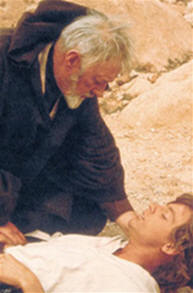 Luke Skywalker wants to belong, to be “somebody,” so he asks his uncle for permission to join the Academy, a pilot school run by the Rebel Alliance. He sees this as his “way out.” Are any of the students you know looking for their own way out? Somewhere deep inside, Luke is experiencing the battle between hope and despair. He has no idea who he is and from where he came. Little does he know that his destiny is moving him toward an old desert hermit known as Obi-Wan Kenobi.
Luke Skywalker wants to belong, to be “somebody,” so he asks his uncle for permission to join the Academy, a pilot school run by the Rebel Alliance. He sees this as his “way out.” Are any of the students you know looking for their own way out? Somewhere deep inside, Luke is experiencing the battle between hope and despair. He has no idea who he is and from where he came. Little does he know that his destiny is moving him toward an old desert hermit known as Obi-Wan Kenobi.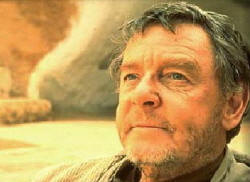 What can story teach us about this dilemma? Through the recent production of three prequel episodes—The Phantom Menace, Attack of the Clones, and Revenge of the Sith—a new generation is discovering the magic and wonder of Star Wars, a movie saga that began in 1977. Let’s take a closer look at that original episode, A New Hope, and mine it for wisdom that might pertain to the matter at hand.
What can story teach us about this dilemma? Through the recent production of three prequel episodes—The Phantom Menace, Attack of the Clones, and Revenge of the Sith—a new generation is discovering the magic and wonder of Star Wars, a movie saga that began in 1977. Let’s take a closer look at that original episode, A New Hope, and mine it for wisdom that might pertain to the matter at hand.  If you don’t have a solid sense of who you are and where you come from, you will be more vulnerable to the pressures of fitting into one particular group or another. Do you know any adults who still have not discovered their place in the world? Do they still fall prey to the pressures of “grown-up” social groups? Do you know any adults who pressure their children to be popular or to participate in a certain activity due to their own insecurities and lack of identity?
If you don’t have a solid sense of who you are and where you come from, you will be more vulnerable to the pressures of fitting into one particular group or another. Do you know any adults who still have not discovered their place in the world? Do they still fall prey to the pressures of “grown-up” social groups? Do you know any adults who pressure their children to be popular or to participate in a certain activity due to their own insecurities and lack of identity?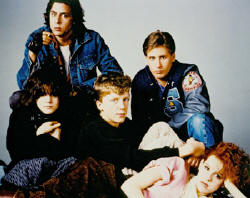 There is nothing inherently wrong with peer groups or cliques. They are common to every middle and high school, typically based on friendships and mutual interests. However, they do have the potential to twist and mold an adolescent into their own image. The coming-of-age movie The Breakfast Club (1985) illustrates this state of affairs in an entertaining yet poignant way. The entire movie takes place in a Saturday detention hall in a suburban Chicago high school. Represented is one member of each social group in the school.
There is nothing inherently wrong with peer groups or cliques. They are common to every middle and high school, typically based on friendships and mutual interests. However, they do have the potential to twist and mold an adolescent into their own image. The coming-of-age movie The Breakfast Club (1985) illustrates this state of affairs in an entertaining yet poignant way. The entire movie takes place in a Saturday detention hall in a suburban Chicago high school. Represented is one member of each social group in the school.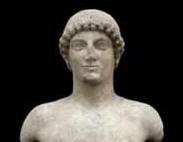 As a parting gift, King Menelaus presented Telemachus with a precious silver bowl, fashioned by the gods themselves. Menelaus informed the prince that another mighty ruler had given him this gift, and that now it was being passed down to Telemachus. This action by Menelaus was very critical to the formation of Telemachus’s identity. Here was an older and wiser individual handing down a precious gift to a younger one. He entrusted Telemachus with something valuable. The unspoken message was that Telemachus was trustworthy. He was capable of keeping valuable treasures. He mattered.
As a parting gift, King Menelaus presented Telemachus with a precious silver bowl, fashioned by the gods themselves. Menelaus informed the prince that another mighty ruler had given him this gift, and that now it was being passed down to Telemachus. This action by Menelaus was very critical to the formation of Telemachus’s identity. Here was an older and wiser individual handing down a precious gift to a younger one. He entrusted Telemachus with something valuable. The unspoken message was that Telemachus was trustworthy. He was capable of keeping valuable treasures. He mattered.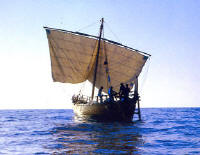 This is the point in the story where the villain of our hearts often fires back with lies and distortions that can make us wonder why we ever hoped for anything better in the first place. Like Telemachus, we too have felt the wounds of our hearts begin to throb. The enemy of the prince’s heart began to whisper, “You’ve heard this all before and paid dearly for it! Your father may have had courage, yes, but look where he is now, at the bottom of the sea. The suitors are too many and too strong for you! Don’t be a fool!”
This is the point in the story where the villain of our hearts often fires back with lies and distortions that can make us wonder why we ever hoped for anything better in the first place. Like Telemachus, we too have felt the wounds of our hearts begin to throb. The enemy of the prince’s heart began to whisper, “You’ve heard this all before and paid dearly for it! Your father may have had courage, yes, but look where he is now, at the bottom of the sea. The suitors are too many and too strong for you! Don’t be a fool!”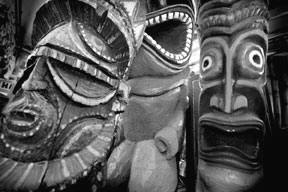 Here is another great quote from Henri Nouwen:
Here is another great quote from Henri Nouwen: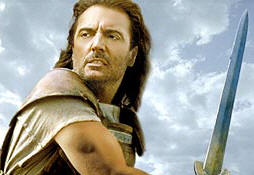 Upon being granted an audience with Menelaus, Telemachus concealed his true identity as prince of Ithaca, while the king remembered old battles and the fall of Troy. The Spartan monarch revealed the heroism and valor of Odysseus—and what he believed to be the fate of Odysseus, declaring his belief that the clever hero rested at the bottom of Poseidon’s sea. However, Menelaus did not stop there. What he did next proved to be crucial to the heart and soul of the young Telemachus. Menelaus correctly ascertained the identity of this mysterious visitor to his court and acknowledged that he saw a strong resemblance between Telemachus and his father.
Upon being granted an audience with Menelaus, Telemachus concealed his true identity as prince of Ithaca, while the king remembered old battles and the fall of Troy. The Spartan monarch revealed the heroism and valor of Odysseus—and what he believed to be the fate of Odysseus, declaring his belief that the clever hero rested at the bottom of Poseidon’s sea. However, Menelaus did not stop there. What he did next proved to be crucial to the heart and soul of the young Telemachus. Menelaus correctly ascertained the identity of this mysterious visitor to his court and acknowledged that he saw a strong resemblance between Telemachus and his father.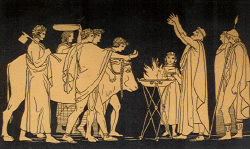 Telemachus bore a heavy burden. His father was rumored to have been lost at sea following the war at Troy, and men from his own town had invaded his home, demanding the hand of his lonely mother in marriage. This young man was the son of a king—and not just any king, mind you, but the legendary Odysseus. Despite being raised as royalty, daily being hailed as “Prince Telemachus,” this young man felt powerless in the face of the older suitors who had aggressively pushed their way into his home.
Telemachus bore a heavy burden. His father was rumored to have been lost at sea following the war at Troy, and men from his own town had invaded his home, demanding the hand of his lonely mother in marriage. This young man was the son of a king—and not just any king, mind you, but the legendary Odysseus. Despite being raised as royalty, daily being hailed as “Prince Telemachus,” this young man felt powerless in the face of the older suitors who had aggressively pushed their way into his home. 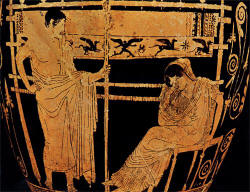 As do we all, the students we work with possess a strong urge to belong. When they enter middle school, many adolescents feel lost almost isolated from all that is familiar. For good or ill, most will desperately seek out peer groups from which they can derive a sense of identity. Homer describes such a longing to discover one’s true identity in the person of Odysseus’s son, Telemachus.
As do we all, the students we work with possess a strong urge to belong. When they enter middle school, many adolescents feel lost almost isolated from all that is familiar. For good or ill, most will desperately seek out peer groups from which they can derive a sense of identity. Homer describes such a longing to discover one’s true identity in the person of Odysseus’s son, Telemachus.

